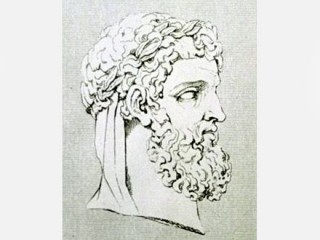
Xenophon biography
Date of birth : -
Date of death : -
Birthplace : Athens, Greece
Nationality : Greek
Category : Historian personalities
Last modified : 2010-09-08
Credited as : Historian , wrote the "Anabasis", contemporary of Socrates
0 votes so far
Sidelights
Xenophon is best known for writing the Anabasis. It recounts the details of Cyrus the Younger's (423?-401 B.C.) Persian campaign and the role Xenophon played in leading his Greek mercenaries back to the Mediterranean after Cyrus's death. Xenophon wrote on a wide range of topics, and his prose was greatly admired in antiquity and strongly influenced Latin literature.
Born around 431 B.C. to the wealthy Athenian aristocrat Gryllus, Xenophon came of age during the Peloponnesian War (431-404 B.C.). He joined the intellectual circle that gathered about Socrates (470?-399 B.C.) and sympathized with their critical attitude towards Athenian democracy. He supported the short-lived oligarchic regimes of the Council of 400 (411 B.C.) and the Thirty Tyrants (404-403 B.C.). When Thracybulus reestablished democracy in Athens, Xenophon became disillusioned and chose to seek his destiny elsewhere.
In 401 B.C. Xenophon joined the Greek mercenaries of prince Cyrus at Sardis, in Lydia. Cyrus's pretext for assembling this force was to rid his satrapy of the Pisidian hillmen. He marched inland with a mixed force that included 14,000 Greeks. As the army headed into Syria, the Greeks realized Cyrus's true goal was to overthrow his brother Artaxerxes II, king of Persia. Promise of rich rewards convinced the Greeks to follow Cyrus down the Euphrates towards Babylon.
The opposing armies met at Cunaxa in early September. The lightly armed troops of the Persian Empire proved no match for the Greek hoplites. However, with victory in his grasp, Cyrus was slain and his Asian mercenaries fled the field in disarray. The Greeks remained undefeated and refused to surrender. During negotiations, their generals were treacherously murdered, leaving them leaderless. Xenophon was among the new commanders immediately elected. He played an important role as the "Ten Thousand," as they were later known, fought their way northward through Kurdistan and Armenia to the Greek port of Trapezus on the Black Sea. Their five-month, 1,500-mi (2,414-km) trek revealed the essential internal weakness of the Persian Empire.
Xenophon continued leading the Ten Thousand. They fought in Bulgaria for the Thracian prince Seuthes before returning to Asia Minor in 399 B.C. with a force of Spartans. There, they defended the Ionian cities against renewed Persian aggression. It was during this time that Xenophon met the Spartan king Agesilaus II (444?-360 B.C.), whom he admired greatly. He returned to Sparta with Agesilaus and served on his staff. He was present at the Battle of Coronea (394 B.C.) when the Spartan king defeated a coalition of Greek cities that included Athens. Shortly thereafter, Xenophon was banished from Athens as a traitor.
In gratitude for his services, Sparta rewarded Xenophon with an estate at Scillus, near Olympia. He married, had two sons, and devoted his leisure time to hunting, entertaining friends, and writing. After Thebes defeated Sparta at the Battle of Leuctra (371 B.C.), Xenophon sought refuge in Corinth. When his banishment was revoked (365? B.C.), he may have returned to Athens. In any case, both his sons were educated there, and the oldest died at Mantinea (362 B.C.) fighting for Athens.
Aside from Anabasis, Xenophon's most important work was Hellenica, which was intended as a continuation of Thucydides's History of the Peloponnesian War, covering the period from 411 to 363 B.C. He wrote various Socratic dialogues and compiled his recollections of Socrates in Memorabilia. His other works include Cyropaedia, a hagiography of Cyrus the Great; Peri hippikes and Hipparchicus, manuals on horsemanship and cavalry tactics; Cynegeticus, a treatise on hunting; and Agesilaos, an encomium of Agesilaus. Peri poron, a pamphlet dealing with Athen's financial difficulties, was written shortly before his death around 355 B.C.
















